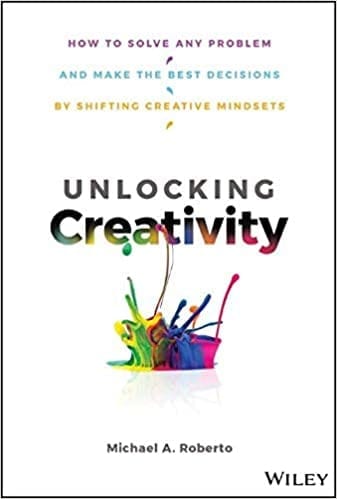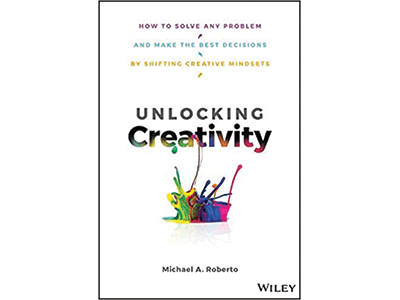Read the Report | by Alex Urrea

Unlocking Creativity, written by Michael Roberto, is a perfect read for all educational leaders and classroom teachers who want to generate comprehensive plans on how to approach this period in education. Mr. Roberto writes about the six mindsets that we must shift in order to think creatively and constructively; I believe that we must reflect on these mindsets so we don’t retreat to the usual comfort zones that have produced mediocre and factory-like results in education for decades. The six mindsets written about are: linear, benchmarking, prediction, structural, focus and the naysayer mindset. I have witnessed these mindsets firsthand in my time in the classroom, in private industry and over the past 20-plus years working with school and district leaders across the country and overseas. They have been impediments to lasting change, sustainable reform and innovation; but when understood can be triggers for success. Let’s unpack the mindsets and how they relate to education management contexts.
Roberto starts with the linear mindset and describes how organizations tend to approach planning in the very traditional pattern of “research-analysis-plan-budget-execute”, which hinders creativity and does not allow for ongoing iteration. He brings DaVinci and design thinking into context and reminds the reader that DaVinci embraced a “learning-by-doing” approach in all creative endeavors; “he engaged in an iterative process of preparation, reflection and adaptation”. As educational leaders begin to plan how to address remote teaching, preparing for the unknown surrounding another period of closure, and learning recovery; they must consider a more open-ended approach to planning and make sure that they reflect hard on what went wrong, what worked well and how we could have been better prepared for the last two months.
“To be great, you must reject doing some things at which others excel.” This point by Roberto refers to the benchmarking mindset, which is endemic in both K-12 and higher education. Steve Jobs stated when reflecting on his Apple career that he was “actually as proud of the many things we haven’t done as the things we have done.” Education leaders sometimes fall into what one of my Superintendent friends calls “managing by survey”, which is a strategy he mentions is used by many of his peers during times of uncertainty. In essence, this gives them both perspective on what others are doing to address common and emerging challenges, but also hinders creativity. Benchmarking is used by companies to assess competitors and measure their effectiveness, but can also prevent innovation because they are working towards meeting benchmarks and goals they did not set themselves.
The prediction mindset is prevalent across many industries, such as the financial sector where analysts are paid well to predict industry performance and stock trends. Roberto refers to Philip Tetlock who has studied the human capacity for forecasting for many years. He has also proven through his research that forecasters, despite a ton of data-driven analysis, have historically poor track records. Tetlock discovered that how people think matters more than what they already know. In a time where districts are using a historic amount of data to drive decision making, the shift in the prediction mindset is necessary so that we don’t keep investing in data tools without first setting a clear cadence as to how we use the data to inform strategies of how to improve student outcomes and constantly reset the bar higher with each success.
The structural mindset is one of the most prevalent mindsets across all industries. Roberto writes about the obsession with reorganization and how leaders revert to a variety of organizational structures when addressing a challenge. There is evidence that creativity and learning flourish when we look at structures and legacy organizations with a fresh perspective and we enable our teams to have agency, share ideas, admit mistakes and ask questions. School systems have what seems like an indelible history of hierarchical structures and organization charts. If we remove the lines around our structural mindset in approaching problems and encourage bold ideation and open-ended discussions, genuine school-by-school education reform may no longer be a panacea. Liberate the great educators we have throughout our schools and enable them to reflect, rethink and rebuild.
When reflecting on the focus mindset, the reader learns how the research around multitasking does not support the benefits many have equated to more productivity. In fact, research has proven that when a person is pulled away from a task or project for even a fraction of time, it can take up to 23 minutes for them to regain their focus. Roberto refers to the term “social distance” not in the way we have experienced that term the last two and a half months, but as a means for team members to achieve some psychological distance to think in a more abstract and decontextualized manner. This can also be done by role-playing sessions. Educational leaders can apply this mindset by having their leadership teams engage in “walk a mile” exercises by imagining themselves in the place of a student for whom they are adopting a new school or district wide curriculum, program or learning resource.
The chapter on the naysayer mindset encourages us to spark divergent thinking and actually provides reasons why having someone on our teams who always acts as the “devil’s advocate” can be positive, not annoying. When someone challenges our ideas, we are forced to rethink the benefits and refine the desired outcomes. The naysayer forces us to build more knowledge through added reflection and defense of the idea or concept. Just as the naysayer helps build a better brand before launching to the public in a product company, this same mindset can help district and school leaders ensure they’ve looked at a new curriculum or program from more perspectives before presenting to a large group of stakeholders.
The final chapter of the book is appropriately called “Leader as Teacher”, which I’m sure is derived from Roberto himself being a lifelong educator (and learner) and his wife a fifth grade teacher. Here he encourages teachers to realize that they are not necessarily conveyors of information but more so “cultivators of curiosity” who inspire and support inquiry that fuels the creative process among their students. When teachers embrace and integrate the design and inquiry process into their pedagogy, students learn to fail as they iterate and teachers have an opportunity to see the discovery and learning process through their students.
District and school leaders should take this historic opportunity to embrace new ideas, escape old ones, and rethink learning to drive sustainable improvements in their schools. A great first step would be to invest in this book and purchase copies for your entire leadership team, start a book club and reflect on the six mindsets together. Enjoy!
Alex Urrea has dedicated his career and philanthropic endeavors to help educators and educational leaders rethink learning. Since founding Eduscape, a certified Minority-Owned Business, Alex has partnered with leading educational technology companies, foundations, universities and STEM education companies to develop and deliver high impact professional learning solutions. He has been a keynote speaker at international educational conferences always trying to deliver the message that innovation in K-12 education is possible if we step back and rethink learning in ways not yet imagined. Alex spends his free time with his family, feeding a voracious desire for reading, and sticking to some sort of fitness regimen.
Michael Roberto is the author of Unlocking Creativity. He is Trustee Professor of Management and Director of the Center for Program Innovation at Bryant University in Smithfield, RI. He joined the tenured faculty at Bryant after serving for six years on the faculty at Harvard Business School. He has written two previous books: Why Great Leaders Don’t Take Yes For An Answer (2nd edition published in 2013), and Know What You Don’t Know, published in 2009. Professor Roberto also has created three best-selling audio/video lecture series for The Great Courses: The Art of Critical Decision Making (2009), Transformational Leadership (2011), and Critical Business Skills: Strategy (2015). In 2017, the Case Centre compiled a list of the 40 best-selling case study authors in the world among over 8,000 faculty members. Professor Roberto ranked #25 on this list.


